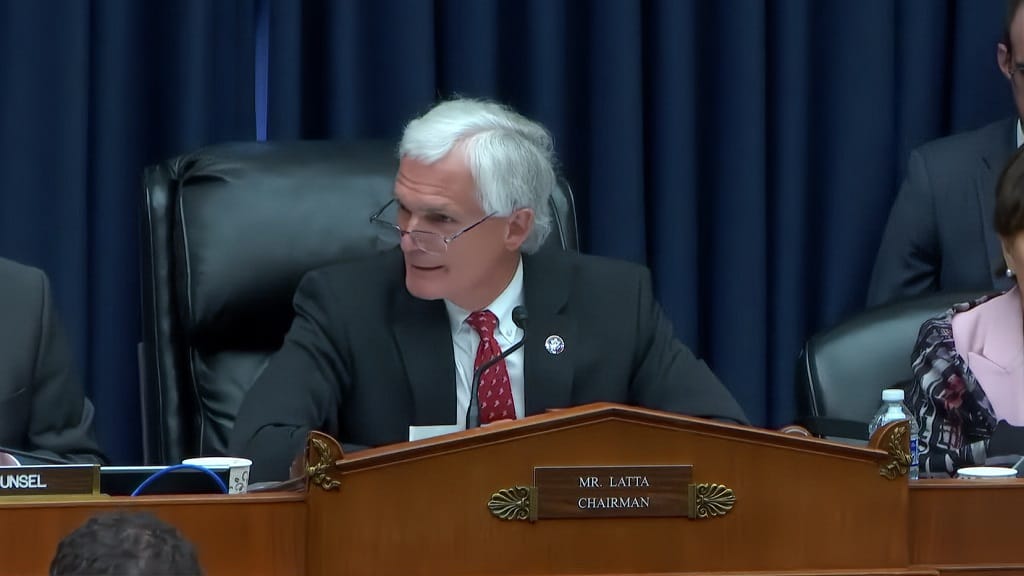Lawmakers Want Spectrum Auction Money to Fund Rip and Replace Program
Energy and Commerce subcommittee voted on 28 bills, most related to reducing permitting barriers.

WASHINGTON, May 18, 2023 – Two lawmakers want money from spectrum auctions to go toward replenishing a program intended to replace telecommunications equipment deemed a national security threat, a subcommittee of the Energy and Commerce committee heard Wednesday.
The Communications and Technology Subcommittee moved a bill forward that would extend the spectrum auction authority of the Federal Communications Commission to June 30, after the authority expired for the first time ever in March. The bill will now be heard at the full Energy and Commerce Committee.
But Rep. Cathy McMorris Rodgers, R-WA, said during the markup stage of the bill – part of 27 other pieces of legislation in consideration on Wednesday – that she and Rep. Frank Pallone, D-N.J., are working on a longer-term deal with some strings attached.
“My goal is to continue working on a broader deal to extend the spectrum auction authority longer term and provide certainty to the FCC and the communications industry,” Rodgers said, noting that they will be working to get a deal done with the Senate, which was where the last attempt to extend the authority failed.
“Our goal is to reauthorize the FCC’s auction authority [and] fund important telecommunications programs, including rip and replace with auction proceeds.”
The rip and replace program, also known as the Secure and Trusted Communications Networks Reimbursement Program, is a $1.9-billion FCC program to reimburse providers that need to replace equipment from Chinese companies Huawei and ZTE over national security concerns emanating from the Communist government.
The FCC and industry have complained about a $3-billion shortfall in the program, with nothing coming from Congress to address that amount. The FCC has said it has received reimbursement requests that greatly exceed the money it was allocated by the legislature.
FCC Chairwoman Jessica Rosenworcel wrote this month to Congress about the commission’s ability to extend the deadline for providers to replace the problematic equipment, in light of the lack of money available for the endeavor.
Senators last month introduced a bill, called the Defend Our Networks Act, to top up the “rip and replace” fund. That came after Senator Mark Warner, D-Virginia, said he would push Congress to make the funding shortfall a priority.
“When this bill moves to the full committee, my goal is to amend it to reflect all of this and extend spectrum auction authority for enough time for us to develop a spectrum pipeline,” Rodgers said, referring to the auctioning the critical airwaves for wireless deployment. “I look forward to working with my colleagues on both sides of the aisle as we develop a deal to amend this placeholder at the full committee.”
Last month, the FCC wrote to Congress requesting that it moves expeditiously to address its spectrum auction authority before the World Radiocommunication Conference in November to “send a strong signal in advance of that meeting of our continued commitment to lead in coming generations of wireless technologies.”
Doris Matsui, D-Calif., said Wednesday that it is especially important to extend the authority before that conference because “it sends a dangerous message to the rest of the world about our ability to lead.”
“This is a national security issue,” added Anna Eshoo, D-Calif. “If spectrum is not handled wisely in our country, it’s not only a national security issue – it’s an issue relative to competitiveness.”
“I’m really disturbed about this thing and there doesn’t seem to be any coming together anywhere,” Eshoo added.
Permitting bills moving forward and outstanding concerns
The subcommittee moved forward other bills largely related to streamlining permitting access by communications companies to structures, to build broadband infrastructure on federal lands, and to standardize the cost of that access to impose “reasonable” limits on state and local governments for what fees they may charge.
The committee also approved a bill that would speed up the process to modify an existing wireless tower by removing or replacing transmission equipment, another that imposes time limits (“shot clocks”) for local governments to evaluate permits, one that requires an interagency strike force for access to federal lands, and another requiring the Department of Interior, the Department of Agriculture, and Commerce’s National Telecommunications and Information Administration to set up an online portal to accept applications to build on those federal plots.
The FCC is considering permit “shot clocks” for wireless infrastructure access as part of its access to poles proceeding. Industry commentators said such time limits provide predictability for builds.
But some lawmakers expressed concern about some of the measures because of what they called a lack of resources at the state and local levels to address the bills’ reduced time to evaluate siting and permitting requests to build the infrastructure.
Pallone, who said there will be a bottleneck at the local offices without additional resources, also expressed concern that some of the bills would “run roughshod” over major environmental and cultural protections.
Experts have been concerned about a lack of streamlined access to structures, including utility pole, that they say are stifling the expansion of broadband and costing Americans millions of dollars.
The package of bills is intended to maximize the effectiveness of the NTIA’s $42.5-billion Broadband Equity, Access and Deployment program, the money from which is expected to be allocated to the states by June 30.








